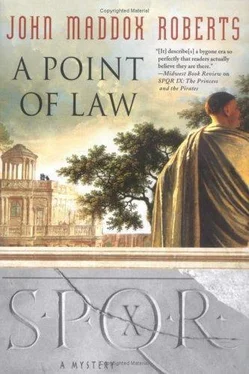John Roberts - A Point of Law
Здесь есть возможность читать онлайн «John Roberts - A Point of Law» весь текст электронной книги совершенно бесплатно (целиком полную версию без сокращений). В некоторых случаях можно слушать аудио, скачать через торрент в формате fb2 и присутствует краткое содержание. Год выпуска: 0101, ISBN: 0101, Издательство: St. Martin, Жанр: Исторический детектив, на английском языке. Описание произведения, (предисловие) а так же отзывы посетителей доступны на портале библиотеки ЛибКат.
- Название:A Point of Law
- Автор:
- Издательство:St. Martin
- Жанр:
- Год:0101
- ISBN:9780312337254
- Рейтинг книги:5 / 5. Голосов: 1
-
Избранное:Добавить в избранное
- Отзывы:
-
Ваша оценка:
- 100
- 1
- 2
- 3
- 4
- 5
A Point of Law: краткое содержание, описание и аннотация
Предлагаем к чтению аннотацию, описание, краткое содержание или предисловие (зависит от того, что написал сам автор книги «A Point of Law»). Если вы не нашли необходимую информацию о книге — напишите в комментариях, мы постараемся отыскать её.
A Point of Law — читать онлайн бесплатно полную книгу (весь текст) целиком
Ниже представлен текст книги, разбитый по страницам. Система сохранения места последней прочитанной страницы, позволяет с удобством читать онлайн бесплатно книгу «A Point of Law», без необходимости каждый раз заново искать на чём Вы остановились. Поставьте закладку, и сможете в любой момент перейти на страницу, на которой закончили чтение.
Интервал:
Закладка:
“And where did Octavia get those men?” Julia asked. “She cultivates her reputation for virtue the way Hortalus cultivates his fish ponds.”
“She got them from Fulvia. One way or another, those two women have been plotting together. Clodius’s widow has retained some control over his supporters, who are Caesarians to a man. It may have irritated Fulvia that her brother was working with the other side. Octavia presented her with a way to control him.”
“How could she have exposed him without incriminating her husband?” Julia asked.
“Either the Marcelli have very carefully kept their own hands clean,” I said, “or else she just didn’t care. Remember our conversation here yesterday when I mentioned that Caesar wanted Octavia to divorce Caius Claudius Marcellus and marry Pompey? I had assumed that she was mortally offended and detested Caesar for demanding that she leave her husband. It was probably Caius who refused.”
“Why did she set Fulvius to attack you?” Callista wanted to know.
“I’d like to believe I’m important enough to be at the center of all this,” I said, “but the sad truth is, I’m nothing. But my family is still extremely influential in the Senate and the assemblies, and they’re turning more and more against Caesar. She had a tool in Marcus Fulvius, and she set him to undermining the Metelli. I was standing for curule office and was a convenient target. I was just back from a foreign command, and nothing is more common than to accuse such a man of corruption overseas. Remember, he had that fine pedigree to flaunt before the public just prior to election time. We speculated that he might have been fishing for a tribuneship by acclimation. If Fulvia had all the old Clodians primed to agitate for him in the consilium plebis , they might have carried it off. Then he’d be untouchable for a year.”
“But how would he have produced his witnesses?” Julia asked.
“Oh, he might have had some people lined up to commit perjury, and it may have been enough just to throw the election into disorder. He might have accused me of bribing away his witnesses or murdering them or something. Enough to get me barred from the election anyway. That would mean one less Metellus holding an important office next year. But something went wrong. The Marcelli, never quick-thinking men, realized what he was up to. Octavia got her slaves out of the house, maybe even warned Fulvius. He put on a dingy, old freedman’s toga and tried to get away, but they caught him and killed him. Then they dumped him on the steps of the basilica.”
“Do you think the various Marcelli, Marcus, Caius, and Marcus, actually killed him with their own hands?” Julia wanted to know. I explained to them Asklepiodes’s analysis of the wounds, and the conclusions I had drawn from them.
“Decius Caecilius,” Callista said, with what seemed to be unfeigned admiration, “I believe you have invented a whole, unique subset of philosophy! Have you ever considered writing a book about this? I am sure that you would be much in demand for lectures at the Museum in Alexandria.”
For a moment I wasn’t certain that I had heard her correctly. “Are you serious?”
“I am always serious about philosophical matters,” she assured me.
I glanced toward Julia. She was looking away, intently studying the fretwork that tastefully graced one of the walls.
“I shall have to give that some thought,” I said. “After all, I’ll have to have something to do during the occasional exile from Rome.” Another thought occurred to me. “Speaking of philosophical things, Callista, I’ve always wondered why the ocean doesn’t run off the edge of the world, taking Our Sea with it, out through the Gates of Hercules.”
“The world is a sphere,” she asserted, “floating in space, so there is no place for the ocean to run off to. This was proven by Eratosthenes almost two hundred years ago.”
“I see. Well, that answers that.” It made at least as much sense as a symbol for nothing.
“Getting back to our problem,” Julia said. “Do you think the Marcelli killed Fulvius with their own hands, and more to the point, can you prove it?” My Julia was always the practical one.
“I simply cannot believe,” Callista said, “that your political intrigues can get this complicated! It makes the struggles of the old Greek city-states seem laughably simpleminded.”
“It wasn’t intended to be this way,” I told her. “This was to be a rather ordinary power play, but it got out of hand. These are not very acute people. As Sallustius characterized them: a crew of second raters. They tried something too difficult for them to control; one of them didn’t even know that his own wife was in the other camp and spying on all their doings. They chose a badly flawed tool in Fulvius, and everybody lied to everyone else and to me. What should have been a clean, discreet operation turned into a tangled mess that called for murder and then a cover-up, which, in turn, called for a false accusation against me. And all this was begun by men of consular standing. It’s really very depressing.”
“However this turns out,” Julia said, “I am going to write to Caesar this evening. He has to know what is going on behind his back here in Rome.”
“Probably a good idea,” I agreed. “But I have a feeling that very little goes on in Rome that Caesar doesn’t know about. I assisted him with his correspondence back at the beginning of the war, remember? He has more friends sending him news and gossip than Cicero. But do go ahead. It will at least set his mind at ease about us. I’ll send him a full report after I’ve wrapped up this business.”
“Why, Decius!” Julia said happily. “I believe this is the first time you’ve acknowledged that Caesar is the real authority in Rome.”
“It seems inevitable now,” I admitted. “I’ve seen too much of the quality of the men ranged against him. Don’t celebrate prematurely though. By the time I write that report, I’ll be praetor, or I’ll be in exile. The first prospect is the ideal one; the second is better than the third.”
“What is the third?” Callista asked.
“Third, I’ll be dead and won’t get a chance to write the report.”
For a while we discussed my best course of action. I was to go on trial in the morning and we went over my defense, the most likely attacks I would face, and my best counterattacks. Julia’s mind for this sort of political-judicial warfare was as fine as that of any professional lawyer in Rome. She lacked only the rhetorical training to be a first-rate advocate. That, and the fact that women couldn’t argue in court.
It was well past dusk when Hermes arrived.
“Where have you been?” I demanded.
“Finding people. We’ve come to escort you home.” He was quite unabashed, and I didn’t feel like berating him as he deserved. Besides, he usually knew what he was doing.
“Who is we?” I asked.
“Some friends.”
Julia and I rose. “Callista,” I said to the Alexandrian, “I cannot thank you enough. I sought an advisor and found a friend. If all goes well tomorrow and the next day, I shall be one of next year’s praetors. It may be that I will be praetor peregrinus , in charge of cases involving resident aliens. If in that office or in any other way I can be of assistance to you, please do not hesitate to call upon me.”
Julia gave her a parting embrace. “My husband is not always perfectly rational, but he means that. And please don’t wait to have some sort of problem to call on us.”
“Just knowing that I have the friendship of the two of you is more than adequate recompense for this small service, which truly was not a service but a pleasure. The thrill of intellectual accomplishment is its own recompense.”
Читать дальшеИнтервал:
Закладка:
Похожие книги на «A Point of Law»
Представляем Вашему вниманию похожие книги на «A Point of Law» списком для выбора. Мы отобрали схожую по названию и смыслу литературу в надежде предоставить читателям больше вариантов отыскать новые, интересные, ещё непрочитанные произведения.
Обсуждение, отзывы о книге «A Point of Law» и просто собственные мнения читателей. Оставьте ваши комментарии, напишите, что Вы думаете о произведении, его смысле или главных героях. Укажите что конкретно понравилось, а что нет, и почему Вы так считаете.









